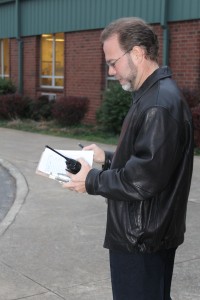
“I am most looking forward to working with other adults to create something that’s new, successful and seeing that success reflected in the students.”
Northwood teacher Phillip Little is working towards becoming a high school principal. In order to become a high school principal, one must have a Master’s degree in school administration. In addition to teaching social studies, Little is taking nine credit hours through UNC and is taking an administrative internship.
“My day is not over at 3:15. It’s over sometimes around 8 o’clock. And then I have to grade papers,” Little said.
Little has been teaching for the past 14 years and says though he loves working with students, he thinks it’s time for a career change.
“I certainly love teaching, but what I have discovered is that as much as I love working with students, I also love working with adults and there are certain things that are sort of crossovers,” Little said.
Northwood is the only place Little has taught, but that is not the limit of his experience. He is looking at other places he could be a principal.
“My experiences are certainly bigger than that because I have been to different schools and have given staff development and have been to other schools to evaluate their programs. But right now I also like the idea of being involved with another school some place close where I can try out some good ideas,” Little said.
Little believes managing a high school is very different from elementary or middle schools. He says it takes a bigger commitment to be a high school principal.
“It takes a commitment to the time because in middle school and elementary school often times they are done at three o’clock and sometimes the biggest things we do don’t start until after three. So I think that [it takes] respect, recognizing the relationships and commitment to the time,” Little said.
Administrators often seem to focus on the discipline of students. However, Little wants to make sure he focuses on other things as well.
“Unfortunately, administrators often times spend a lot of time not working with teaching and learning,” Little said. “It’s all about teaching and learning.”
Still, Little acknowledges discipline will play a large role in his new job.
“A lot of it is assigning ASD or ISS or out of school suspension. Negotiating that, I think, is the least gratifying part of the job unless it makes them change. If it makes a change in a student and suddenly everything is better then it was certainly worth your while,” Little said.
One model does not fit every school. Different schools have different needs and problems.
“Just like everybody that goes to the emergency rooms, everybody doesn’t get treated the same way. Schools have different strengths and different challenges,” Little said.
To Little, at the end of the day, it is more than just creating a change in one classroom, but in a whole school.
“I really think creating into a bigger product and that product is not just a successful class, it’s creating a successful school.”
— By Jessica Clayton
